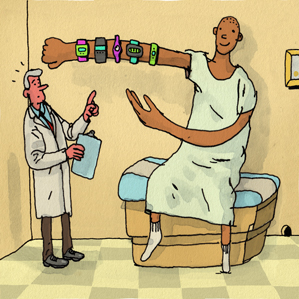You may think your smart watch or activity tracker can help you keep tabs on your health, but don’t be shocked if your doctor is more skeptical.
Wearable producers such as Apple, Fitbit, and Pebble will ship more than 76 million of the devices by the end of the year, according to market research firm IDC. Some doctors and researchers, however, remain unimpressed, They question the value of the particular metrics tracked, as well as the validity of the deluge of data these gadgets produce.
“I’m an oncologist, and I have these patients who are proto ‘quantified self’ kinds of people,” says Andrew Trister, an oncologist at the nonprofit medical research organization Sage Bionetworks. “They come in with these very large Excel spreadsheets, with all this information—I have no idea what to do with that.”
Trister says that his colleagues have had patients bring in their own wearable-gathered data, too, and they’re “really taken aback” by it. It’s very difficult, clinically, to interpret trends that come out of such information, he says.
Neil Sehgal, a senior research scientist at the UCSF Center for Digital Health Innovation who has a doctorate in public health, agrees. “Clinicians can’t do a lot with the number of steps you’ve taken in a day,” he says.
Sehgal should know: he and his colleagues at the Center for Digital Health Innovation have compared the data reported by consumer wearable devices to relevant clinical gold standards in multiple studies over the past two years. They’ve found that very few devices currently on the market perform with the reliability one would expect from a medical-grade device.
And in fact wearable devices such as the Fitbit haven’t been clinically validated to perform at the same standards for reliability that the U.S. Food and Drug Administration uses for medical devices, such as the traditional blood-pressure cuff in a doctor’s office. Consumer wearables are marketed under the FDA’s less rigorous “wellness-focused” rubric.
Yet while sensor-embedded wearables will need to get a lot more reliable before doctors find them useful, Sehgal acknowledges that devices such as the Apple Watch or the Polar heart-rate monitor have been useful because they’ve helped some people get more active. However, he says, “Where I think the rubber really meets the road is: can you take people with chronic disease and manage it with these devices? It’s still too early to say.”
